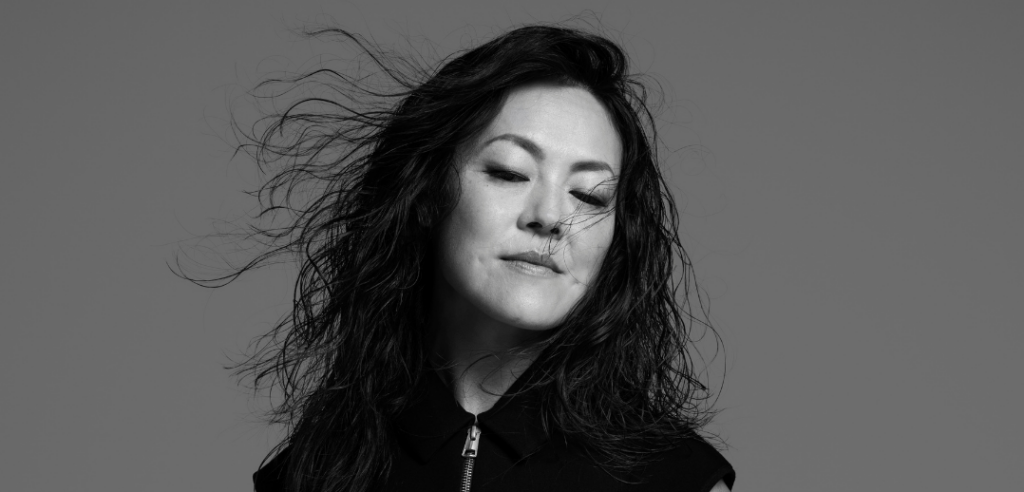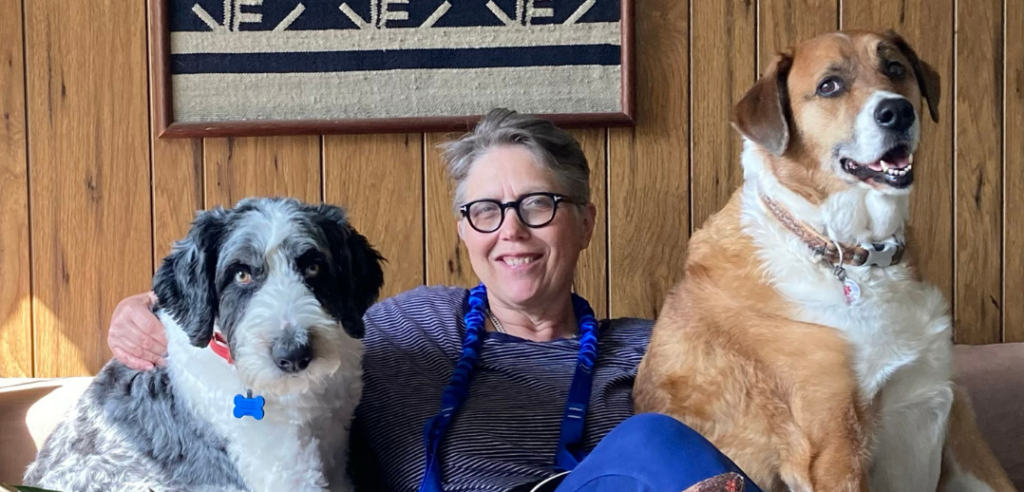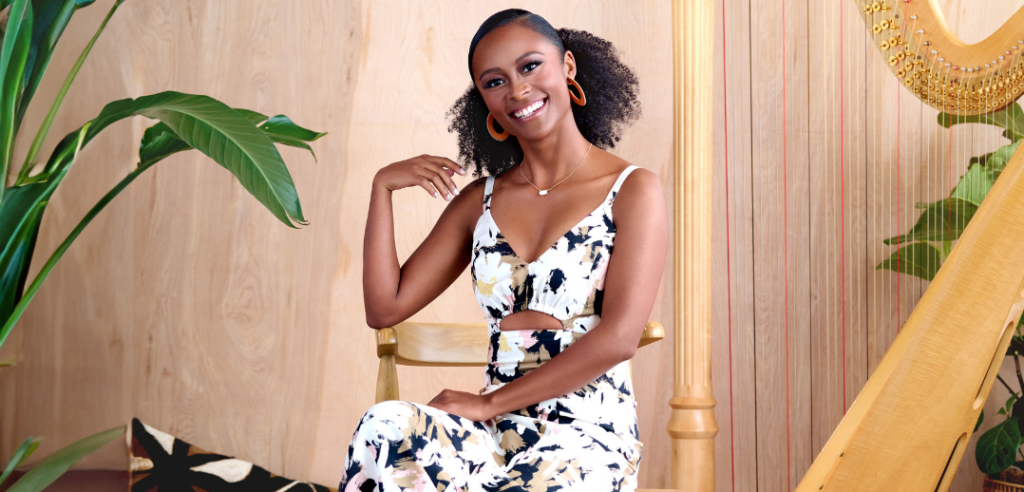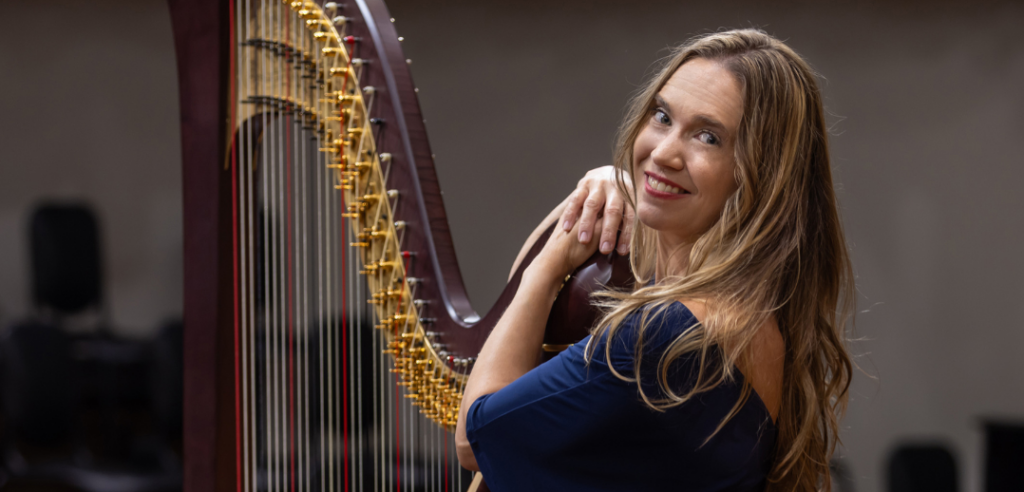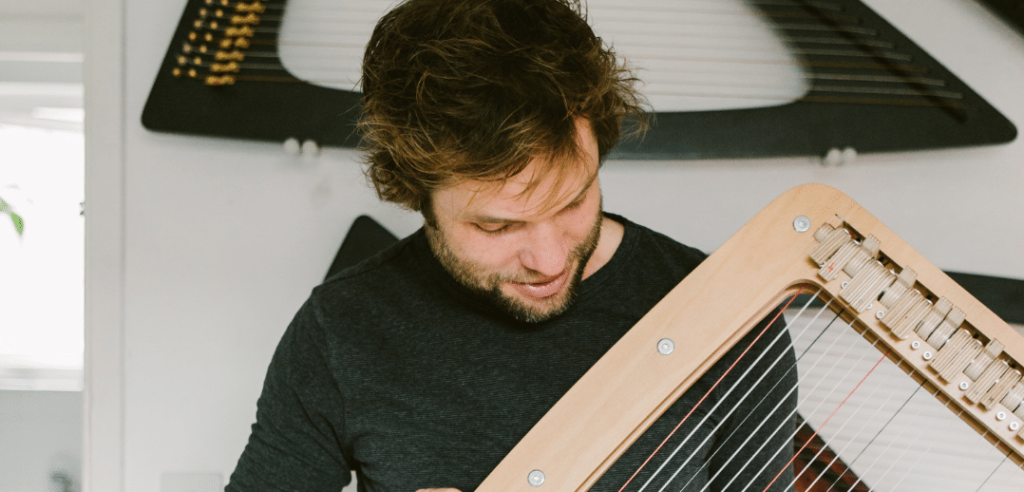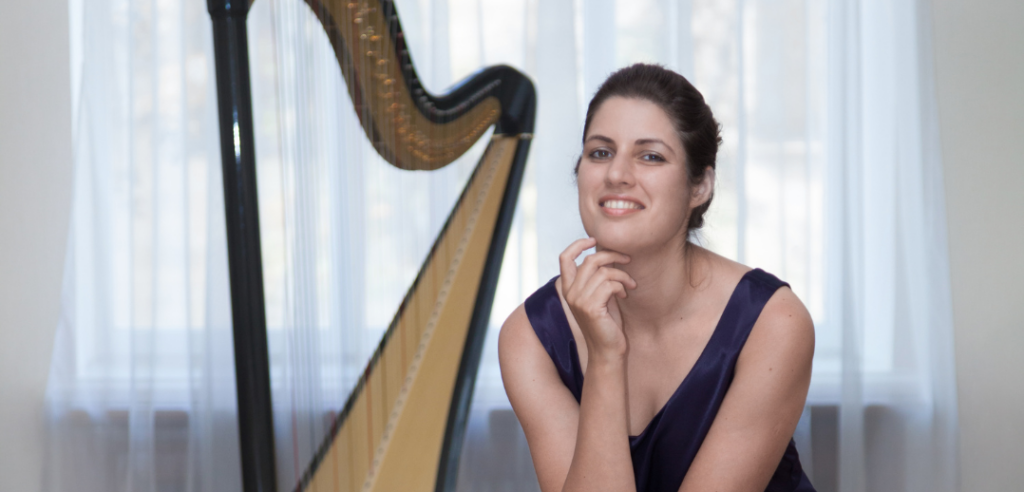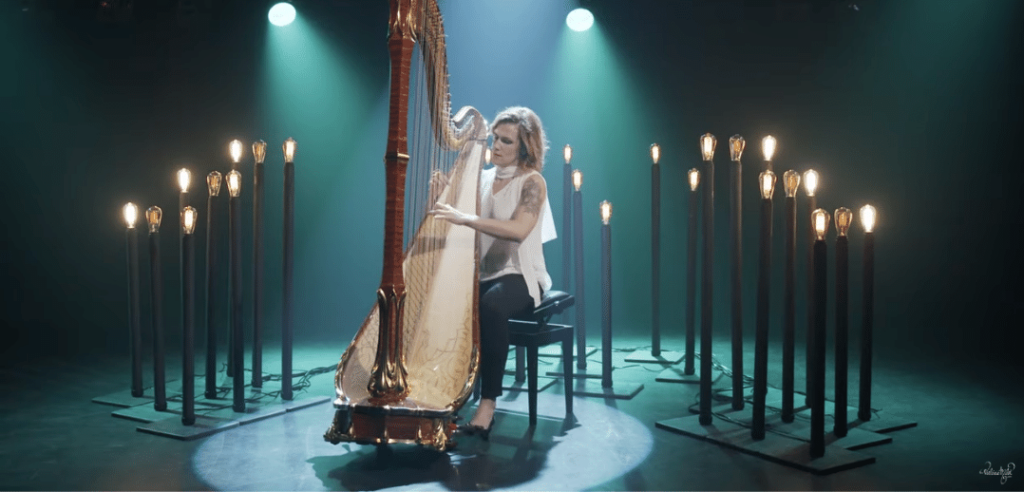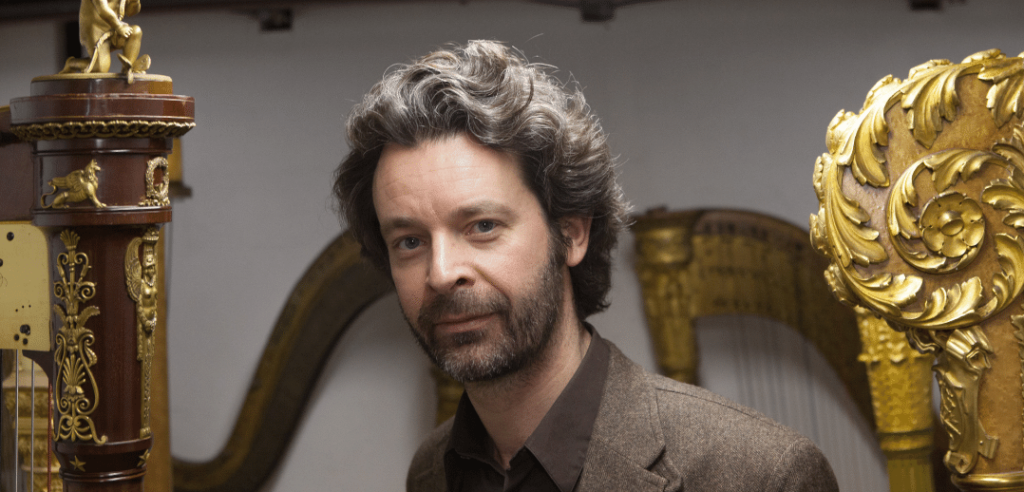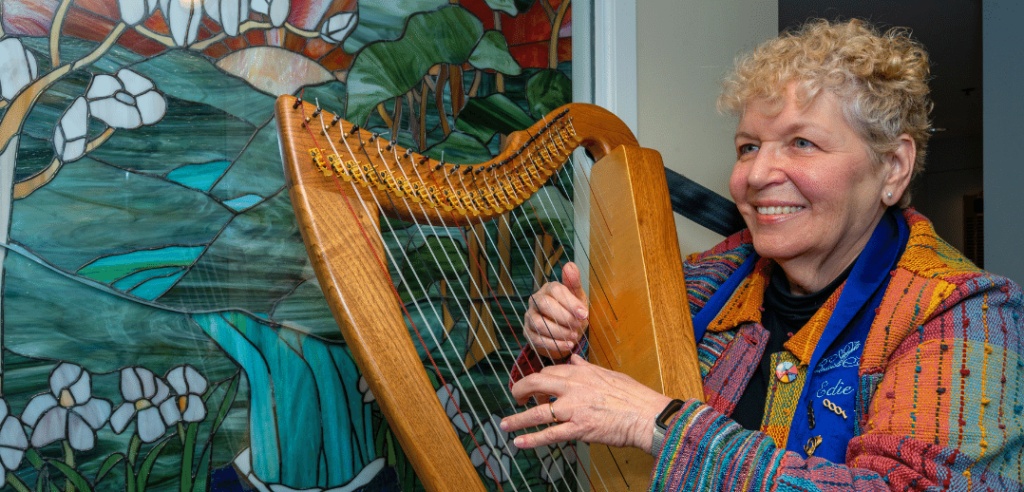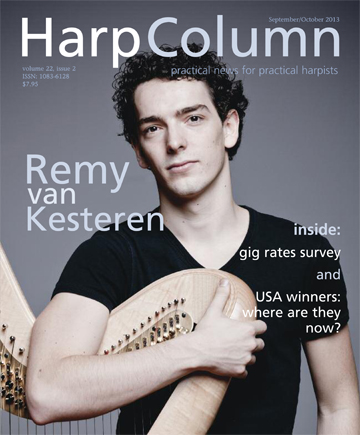- The many faces of Remy van Kesteren. (Photo courtesy Linelle Deunk.)
- Remy and USA IHC Founder and Artistic Director Susann McDonald in front of the new custom Lyon & Healy harp given to the gold medal winner. (Photo courtesy Maximillian Tortoriello.)
- Remy is all smiles following his performance of the Reinecke Conerto in the final stage of the USA IHC. (Photo courtesy Maximillian Tortoriello.)
- Remy van Kesteren is named the Gold Medal winner of the 2013 USA International Harp Competition.
- “There was a time that I was so frustrated that I was not a pianist or a violinist,” recalls Remy. “But at some point I said, ‘Yeah, okay, harp is my instrument. I need to make music and I happen to sit behind a harp. Okay. So I do it on a harp.’” Previous Next
Remy van Kesteren sought redemption at the USA International Harp Competition, and he got it.
In 2009, Remy van Kesteren made it to the final stage of the International Harp Contest in Israel. He finished third. Not bad for a teenager performing on an international stage with an orchestra for the first time.
Though the story didn’t end how he had hoped in Israel, Remy moved on. He went to Paris to study with Isabelle Moretti. He started the Dutch Harp Festival and Competition (which will have its third edition in 2014). He performed. He collaborated. He thought he was done with international competitions. But when you see his face cringe ever so slightly and his eyes look wistful as he talked about coming oh-so-close in Israel, you can tell, he wanted another shot.
So Remy put his reputation on the line and entered the 9th USA International Harp Competition this past July in Bloomington, Ind. This time, Remy got his fairytale ending. We caught up with him the morning after his gold-medal win.
Harp Column: It was a really exciting night. That jury deliberated a long time! [Laughs]
Remy van Kesteren: Yes. It was quite a wait!
HC: Well, tell me, what was your reaction in the moment that you knew you were the winner?
RVK: I think I was quite shocked and surprised, obviously very happy—I’ve been looking forward to it. I came here to win, but I wasn’t too sure after the finals. Also because Marta (Marinelli) and Emily (Levin) are such strong players, and you never know what’s going to happen. And I’ve been in finals before four years ago in Israel, and then I didn’t make it, so you never know. It was such a strange situation, and I actually I thought I was not going to win, and then suddenly it came as a great surprise. I was very happy!
[protection_text]
HC: Great. I’m always curious about that moment when you walk onto stage, and there’s a full house, and you’re in the finals of this epic competition—can you describe that moment? I mean, are you zoned in, are you just locked in to what you have to do or are you able to absorb the moment at all?
RVK: When I come on stage I always try to make contact with people. But yes, when you’re in such a situation, you are a little bit zoned in. But I try to be open because I know when you are locked in too much you don’t have any contact and making music is about making contact. Otherwise if I just do what I want and they sit there, then they could just as well put on a CD. It is about the interaction, so I really try to have this, I think last night, well, I really felt a connection.
HC: Well, you got a huge hand from the audience. You could tell the audience really liked your performance—really liked you. So, who was the first person you called when you finally got a moment after the finals?
RVK: My mom. Yeah, not very original, but she wasn’t sleeping. She stayed up, I think.
HC: Oh my. Well, it was the next morning practically!
RVK: Yeah, it must have been four or five a.m., but I think she couldn’t sleep and she’s been, of course, very special but especially because she did everything for me when I was younger. She always drove me with the harp to every little lesson or concert all these years, and she’s been still a great support. And after that [I called] my girlfriend and then my teacher.
HC: Neat. Well, earlier you mentioned competing in Israel four years ago. In 2009 you were in the finals there and came away with the bronze medal [no first prize was awarded that year]. How do you think that experience prepare you for this competition?
RVK: Well, of course I knew, more or less, what was coming.
HC: What do you mean when you say, “I knew what was coming?”
RVK: Well, the length of such a competition. Because a lot of competitions, they last a couple days, but this is 10 days, and that is a lot, because of course you live so intensely and you are preparing all the time. The hardest part is playing on stage and then you have almost no time to relax because you have to prepare for the next one. You have to be mentally ready and physically ready with your fingers and everything, and musically ready with the piece that you are playing at the moment—I think that’s the largest challenge. Of course you have to learn everything, but then you have to make sure that you peak at the right time. I think Israel prepared me for this, because there I may have not been ready yet. Also I remembered when I played at the finals it was my first time to play with a large orchestra, and now over the last couple years I did that many times and so these are things that, of course, help you a lot. And I got older—actually, I didn’t think I would do a competition again. But then this came along and I really liked the repertoire, so I decided to do it, and I really think that this experience from the past has helped.
HC: So do you think there was a certain amount of pressure coming into this competition having been a finalist in Israel four years ago?
RVK: Oh yes, there was. Well, at least for me, I could feel it very much. The minute I came here people knew me already, and that was a little bit, well, it wasn’t a problem, but it increased the tension a little bit because people were saying, “Oh, you’ll make it to the finals. Yeah, you were in Israel.” I mean, of course it’s a risk that if you’re kicked out in the first stage after being third in Israel, then people will remember that. You’re as good as your last performance also is true in a competition. So that was a lot of pressure. I remember when it was announced that I made it to the finals, it was…[Exhales]
HC: Relief.
RVK: Yes, big relief.
HC: So, you kind of touched a little bit on something I wanted to ask which is, you’ve had so much success in international competitions, what motivated you to do this one, because this competition takes so much preparation.
RVK: I graduated half a year ago, and I’ve been finding out what my direction is that I want to take. I felt that I became more and more focused on that, and then I thought well, before I do that, there was still something in there that I wanted to have, another opportunity to make up for Israel, because I still felt like, “Ah, I should have won.” And at the same time I looked at the repertoire [for USA] and I really liked it and I knew that if I didn’t do a competition, I probably wouldn’t ever play it and thought it would be great to one more time try it and also to give myself more time also to think about what comes next. Just to start practicing this large bulk repertoire, and it was great to find that some pieces that I think I would never play, I actually really enjoy and I will play a lot more in the future I hope.
HC: Can you talk a little bit about your preparation? How long have you worked on this repertoire?
RVK: Compared to Israel I started late. I started in February. It was a short timespan and very intense. I worked very hard. Of course some pieces I knew in advance. I played the concerto and a couple of other pieces, but it was a lot, and I think what I’ve learned is to know exactly at the time it needs to be ready. If I would have to play the competition two weeks earlier, I would have had a problem because it was not finished. It really happened the last week things came together.
HC: Tell me about your preparation in the few weeks leading up to the competition. I mean, what was your daily routine like?
RVK: [Laughs] As a matter of fact, I had two short concert tours with completely different things right before it, so I went to UK first with my ensemble— I have a trio which I play. And then there was a music festival in Austria where I was invited. And that was actually perfect because I wasn’t playing so much. I was playing Debussy and a wonderful quintet by Bach and some others, but I also had some spots on this festival to try some solo works and I was in a castle and there was a lot of free time and a very good atmosphere for us. And then when I was done there, I went to my old teacher who I’ve studied with for 13 years, Erika Waardenburg. She always invites me to her house. I stayed at her house for a week, and before that I was also there another week. I can just study there and she gives me some help and some lessons and that was really the best. So really the week before I was completely locked up, and then everything was ready.
HC: That’s amazing. So after winning first prize here, do you feel like you’ve arrived, like this is the end? Or do you feel like this is just another step on a journey?
RVK: I guess it’s another step, it’s like building your career, literally, and I don’t have the idea that I used to have before I entered any of the competitions. I felt, well if you win a competition then you’re done and you can just play and enjoy life. I’ve become a little bit more realistic, and I know that [winning] can really help, but you have to keep working, of course. There are so many stories of first prize winners who are completely forgotten because they, well, either they get too arrogant, or they stop preparing, or they just sit next to the phone and wait for people to call for concerts and I know this is not the case. But it definitely helps of course now because people know me so that’s good. [Laughs]
HC: Well you might not have had enough time to reflect because you just won last night, but what’s next for you?
RVK: What’s next? Well, a lot of playing and fortunately I have my concert agendas pretty full next year, so I’ll be playing a lot, and I’ve been thinking a lot about the way that we present our concerts. For example, what I find a little bit strange sometimes, is that it is only in classical music that we present our programs with a program. If you look at pop music or jazz music you just go to a concert because you want to see a performer. And I understand this with string quartets because they play Beethoven and people go to hear a specific Beethoven [piece], but with harp, to be honest, our repertoire is not so well-known outside of harpists. I find this a great opportunity to get rid of the whole program thing, because I also enjoy telling people about the works and telling my personal link to things, and so I want to develop this further and I’ve been talking to concert promoters and telling them I’m not giving a program anymore. [Laughs]
HC: So what’s the reaction to that?
RVK: Well actually, it was better than I expected. I thought they would have a big problem with it. I’m working together with a director for next year, and I have a lot of ideas of the pieces I want to play, and then we’re going to try to make a story throughout because the thing I’m really inspired by is the old role of the harp as a story-telling instrument. We had, at least in Europe, the Troubadours and the minstrels with the harp or the lyre traveling around and playing and making music and telling stories, and I feel in some ways musicians are still like this. I mean, we don’t travel with horse anymore, but we still go all over the world, and we want to share our music with people. This idea is growing in my head and I want to develop this further and see how our concert could really be like a musical experience where you experience the story.
HC: Yes. It’s a really interesting concept. So I noticed in the third round here, in your free choice program, one of the pieces you played was an arrangement you did of the Shostokovich Prelude and Fugue. Have you done a lot of your own arranging and is that something you want to pursue?
RVK: I like to. When I hear music that just moves me like the Shostakovich, when I heard it the first time, I had to cry, so I wanted to play it. There was a time that I was so frustrated that I was not a pianist or a violinist, but at some point I said, “Yeah, okay, harp is my instrument. I need to make music and I happen to sit behind a harp. Okay. So I do it on a harp.” This was an eye-opener to me. It’s not such a complicated thing to figure out—it’s actually very simple—but when I thought about it like that, then suddenly I realized that actually I have so much freedom to do what I want. So I’ve been transcribing a lot, and I’ve been taking composition lessons from the start of this year.
HC: Do you plan to publish anything? Can we get our hands on it? [Laughs]
RVK: [Laughs] Publishing is, well, that might be a next step, but I will definitely continue playing, and I wish next year to try and play one of my own pieces but I’m not sure if I’m happy enough with it.
HC: One of your own original compositions?
RVK: Yes, one of my own arrangements.
HC: Great. Well is there anything that you want to say, especially to the younger harpists out there?
RVK: Well, I would say that, in regards to competitions, we tend to focus on competitions. I did this when I was young. We focus on them and know they’re very important and that you really need to do them, and you need to win, and this of course is a good thing because it can help you. But at the same time I think the biggest thing that I’ve learned in the last four years after Israel was that I needed to have patience. And I think this is my task for the rest of my life—to have patience. I’ve studied with Isabelle Moretti and the one thing she kept saying was, “You can do whatever you want, but you need to give it time and it will come.” And it was a very frustrating thing for me to hear because I wanted it now and it needs to be now. You don’t want to hear, “Well, in a couple of years you’ll understand and you’ll figure it out.” But she was absolutely right, and I think this is the biggest lesson—trust yourself and trust also your ideas and do whatever you want to do. I mean, all the things that I did in my life, I always tried to follow whatever I liked to do, when I felt like organizing my own festival, I tried to do it. I didn’t think, well, is it going to help me? When I wanted to take singing lessons, I took singing lessons. Or dancing. It all helps and it makes you richer as a person, and if you try to be patient then I think it will connect and you might actually win a competition! [Laughs]
HC: That’s great. Congratulations. I’m thrilled for you. I can’t wait to see what you come up with next.
RVK: [Laughs] Me either!










